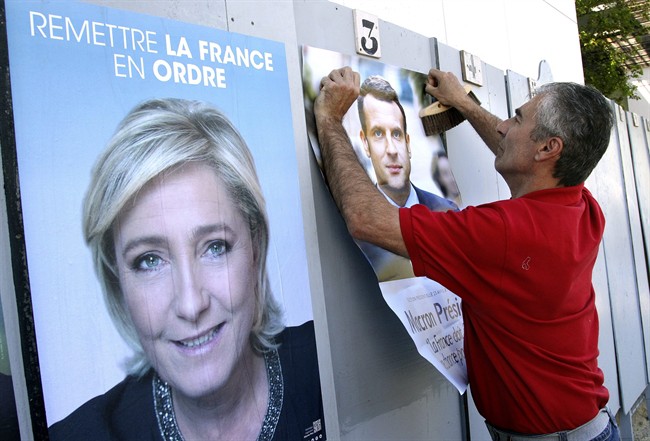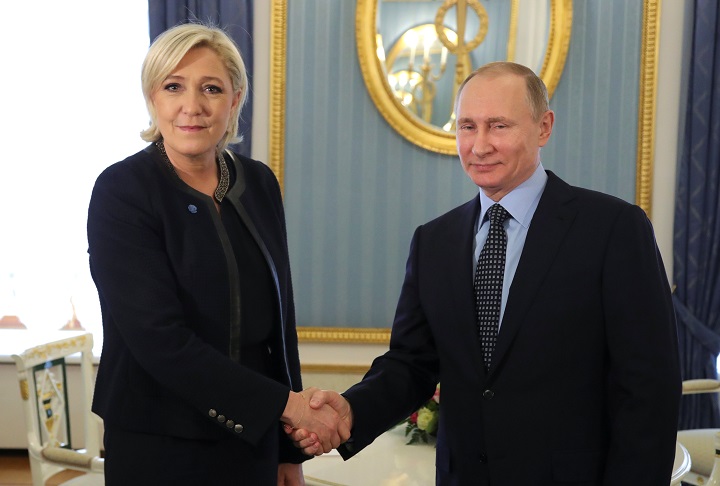The first round of the French presidential election concluded Sunday with Emmanuel Macron of En Marche! coming in first and Marine Le Pen, former head of the National Front, close behind. None of the 11 candidates won more than 50 per cent of the vote, so there will be a run-off vote on May 7.

This election marks a historic moment in French history, where the public will decide between two candidates with radically different visions for France’s future.
Here is a look at the two finalists in France’s presidential election.
Marine Le Pen, 48
Marine Le Pen was a controversial figure far before her ascension into politics. Her father, Jean-Marie Le Pen, founded the National Front in 1972 and led the party until 2011. In May 2015, he was suspended from the party for repeating his view that the Holocaust was “a detail of history. Later that year, he was expelled from the party.
Marine Le Pen had been involved with the National Front since she was 13, and with a background as a talented lawyer, had risen from the ranks to become her father’s second-in-command. She became leader in 2011 and tried to distance the party from its racist and anti-Semitic past.
Before 2011, Le Pen had run for seats in both the French and European parliaments and remains an MEP (Member of European Parliament) today. She eventually joined her father’s party as a legal adviser in 2008, reports CNN.
WATCH: French expats in Montreal react to first-round election results

As leader of the party, she’s tried to soften the National Front’s image to make it more accessible to France’s working class. However, she maintains nationalistic, anti-globalization policy proposals. Some of these include reducing immigration from 200,000 to 10,000 “entries” per year and limiting immigrants’ access to public services.
She claims to be economically conservative, but she also believes in protecting French workers with a robust “safety net.” She’s managed to attract the support among blue collar workers in France with these policies, some of who view immigration as the source of many conflicts in the country.
She’s also promised to remove illegal immigrants from the country entirely, saying that French citizenship should be “inherited or merited.” Le Pen supports dropping the euro and reinstating the franc as the national currency. She also promises a Brexit-like referendum on whether to remain in the European Union, if she’s elected. In keeping with her isolationist policies, Le Pen also supports France’s withdrawal from NATO.
She’s often described how the election of Donald Trump and the Brexit debates will boost her support as a fellow populist political figure.
Also
Emmanuel Macron, 39, En Marche!
Emmanuel Macron was born into a middle-class family in the northern French city of Amiens and was educated primarily at Catholic private schools. He married his high school drama teacher in 2007, Brigitte Trogneaux, whom he met when he was just a high school student himself. While she’s 24 years his senior, they now share a home in Paris with her three children from a previous marriage.
Macron worked as a civil servant before leaving government to become an investment banker. In 2012, socialist President Francois Hollande selected him as his deputy chief of staff in 2012.
WATCH: Obama endorses Macron for French presidency

Two years after being selected as Hollande’s chief of staff, Macron was promoted to the role of economy minister. During his time in Hollande’s government, he drew the ire of the traditional left for attempting to renegotiate the 35-hour workweek.
WATCH: French presidential candidate Macron greets supporters after winning first round

Macron left Hollande’s administration in 2016 to start his own party called En Marche! While no one would have believed it then, 18 months later the movement had signed up over 200,000 members.
Macron has portrayed himself as a socialist liberal, although he has been described as a centrist.
His policies contrast Le Pen’s in many ways, including a pro-globalization, pro-multiculturalism approach. He vows to cut taxes, provide support for low-income citizens and has also vowed to bring unemployment down from 10 per cent to seven per cent.
WATCH: French voters narrow choice for president to Macron, Le Pen

Macron has pledged €50 billion towards public infrastructure and promises a shift to renewable energy. He’s also presented a strategy to reduce red tape for companies, including cutting corporate tax, allowing companies to renegotiate the 35-hour work week and making it easier for corporations to hire and fire, measures that are unpopular with traditional supporters of France’s Socialist Party.
Despite having trouble winning over Le Pen’s blue-collar base, Macron took home first place in the most recent round of the French election and will face Le Pen in a runoff on May 7.


















































Comments